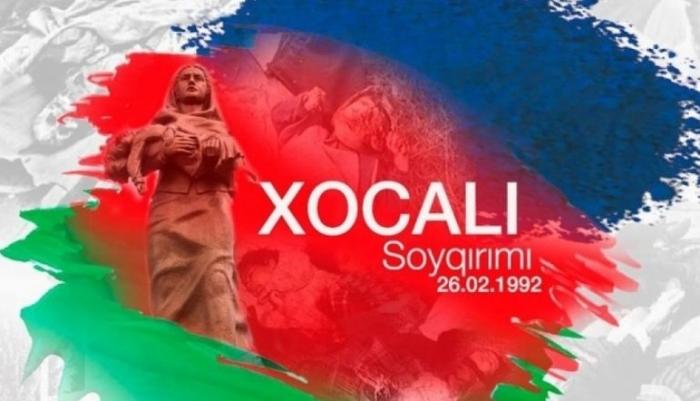
As I looked at the footage and tapes depicting the Khojaly tragedy, which I couldn't watch until the end today, as it was 30 years ago, I understood once again that the perverted enemy has inflicted a wound on us that we will not forget throughout our lives and that will always burn our hearts. Perhaps, it is possible to overcome the pain and weight of our lost childhood and youth, the smile that freezes in our eyes, our ruined ancestral home, after 30 years we go to the gate of our house and the words of the guide - it is dangerous, we cannot enter - cut us like a barbed wire, but The Khojaly tragedy is enough fact and document to stay awake forever and not to forget our enemy. The Khojaly genocide, which is the greatest tragedy of the 20th century, is a disgrace and a place of shame for all humanity, regardless of their nationality.
February 26 is the day when the pink curtain hanging before our eyes opens and falls. From behind the falling curtain, it was seen that terrible giants, clawed creatures are not only in scary fairy tales, but perhaps they moved from life to fairy tales. The frozen corpses of children who were not old enough to read scary stories became the characters of those stories. But "Khojali" was not a fairy tale, it was not a sad story or an epic, even though it was the subject of hundreds of old songs and laments, sad lullabies, it was not old songs and songs. "Khojali" was a bitter reality of life, a wound of history that never heals. "Khojaly" was the signed and sealed execution document that our enemies presented to the whole world and humanity.
Until that day, our adults, who changed the channel whenever there was a slightly impressive episode in any movie, and protected children from any psychological burden and shock, stood dumbfounded in front of the terrible, unimaginable scenes, and forgot to rub the little ones next to them. On February 26, as a result of the bloody act of the hated enemy, many slogans fell from the walls. These were not only artificially created slogans about "friendship of peoples", "friendly neighbor", "Kur, Araz, Ararat", but also historical slogans such as "a man does not cry", "they do not raise a hand to a woman", "a close neighbor is better than a distant relative". crystal sayings filtered through the filter, which our treacherous enemies hit and sprinkled with a black stone. On that day, we witnessed the tears of men searching for their relatives among the corpses, crying in one way when they found them and in another way when they did not find them, the tragedy of children who were terrorized with their dolls and toys, the torture of women and the elderly, experiences that tested the last limit of endurance, and what, what else. . Staining the snow with blood, dreaming of unopened flowers in his eyes, scaring even the wild animals in the forest with his cruelty, "Armenian is the serpent of the earth, the enemy of humanity" (Sadi Shirazi), "the worst of the white-skinned slaves. They have no shame, their thefts are quite famous" (Adam Mets), "The fault of the Armenians is that they are bad-tempered, cowardly, thieves, blind, running away, not listening to orders, making unnecessary noise, unfaithful, hypocritical, cursing, cold-hearted, enemies to their master" (Qabusnama). , "If you have seen an Armenian in a dream, be very careful, know that they will deceive you or betray you" (Olga Smurova), our enemy is the fascist Armenians who repeatedly prove many proverbs. This forces us to be constantly awake, not to repeat our "mistakes" such as believing and forgiving. Throughout history, our people, who are distinguished by their compassionate behavior towards those who shelter them, those who are weaker than themselves, choose them as neighbors, actually created this forced aggressive attitude towards the hated enemy. Our notorious "neighbors" themselves are the author of the feeling of hatred, which we hardly instill in ourselves, and in fact are alien to us. Although they laid the foundation for it from time to time, in the winter night of 92 they reached their fence and raised their tower. February 26 was the last night of our generation's childhood. Our generation was separated from its childhood by the sound of bullets and war, the smell of gunpowder and blood, and the half-life stories of our peers.
"Khojali" is an indictment of the whole humanity of the blood-curdling lives of an entire country, the lives of hundreds of people whose lives were broken by oppression, the babies who were forcibly thrown away from their cradles, the young people whose wedding tents were left unfinished, the families whose hot stoves were extinguished with blood, and the old people whose graves were not dug in their homes. And finally, it is a terrible accusation, a cruel sentence, which Armenian fascism has prepared for itself with its own hands and tongue. It is not only us, many countries of the world who recognize and confirm it as a tragedy after hundreds of documents and facts presented. The owners of bad deeds also write this in their confessions in their memoirs and diaries, and in their bloody works, which they declare with joy and excitement. As written by Zori Balayan, the black face of humanity, in his filthy scribbling entitled "Revival of my soul".
